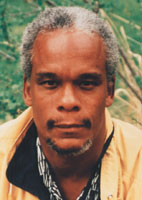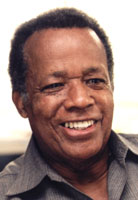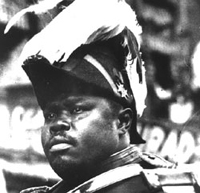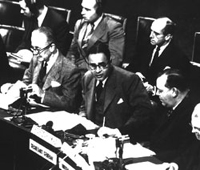CALL TO ORDER
Two veteran African-American filmmakers, William Greaves and Stanley Nelson, return to Sundance with documentaries on the lives of prominent black historical subjects, Ralph Bunche and Marcus Garvey.
Beginning his career as a featured actor on stage, screen and television, William Greaves subsequently moved behind the camera and produced and/or directed more than 200 documentary films, many of which chronicle the lives and concerns of African Americans, including Booker T. Washington: The Life and Legacy, Frederick Douglass: An American Life, and From These Roots, a cultural exploration of the Harlem Renaissance of the 1920s. He also executive produced Bustin’ Loose, starring Richard Pryor and Cicely Tyson, and produced, wrote and directed three features: Ali, the Fighter, with Muhammad Ali and Joe Frazier, The Marijuana Affair, starring Calvin Lockhart and Ingrid Wang, and the groundbreaking avant-garde film Symbiopsychotaxiplasm: Take One, which Greaves is currently fashioning a sequel to in collaboration with actor/director Steve Buscemi. This year, Greaves returns to Sundance with Ralph Bunche: An American Odyssey, a feature-length documentary narrated by Sidney Poitier examining the life and times of the renowned U.N. statesman, intellectual and scholar who was awarded the Nobel Peace Prize in 1950.
Director Stanley Nelson, who won the Freedom of Expression Award at the 1999 Sundance Film Festival for his film, The Black Press: Soldiers without Swords, about the ascent of black-owned newspapers in the U.S., began his career as an apprentice at William Greaves Productions. Returning to Sundance this year with Marcus Garvey: Look for Me in the Whirlwind, a feature-length portrait of the leader of the largest organized movement in black history, it seemed fitting to ask Stanley Nelson and Bill Greaves to sit down over lunch to discuss their respective films.
 |
| Stanley Nelson |
WILLIAM GREAVES: I heard about him when I was coming up as an actor in the late ’40s. He had done this incredible thing, brokering an [Arab-Israeli] armistice in Palestine, and was getting a lot of coverage in the newspapers. He was very popular, but nobody really knew that much about him; all that most people knew was that he was an important black man of some kind. Later on, I had a chance to work in the United Nations and I did see him occasionally, but only at a distance. By the ’60s, people had begun to complain about him. As a prominent black man, [they felt] he wasn’t involved enough in the Civil Rights movement. So, he’d always been an enigma for me. And I thought, why don’t I explore this and find out who this guy really was? A friend of mine told me that the Ford Foundation was interested in Bunche and that a friend of Bunche’s, Sir Brian Urquhart, who succeeded him as Under Secretary General of the U.N., was writing a book on Bunche. So I approached the Ford Foundation with the idea of making a film, and they went for it. Once I got into the research about him, I discovered he was a fascinating person, and also how powerful and influential he was. How did you get interested in Marcus Garvey?
NELSON: I became interested in Garvey when I was working on my film, The Black Press. I became fascinated first by his newspaper, the Negro World, [but] we weren’t really able to give [that newspaper] its due in [the film]. We were sitting around during the editing phase of Black Press talking about it with the whole team and I asked if anyone had ever seen a film on Marcus Garvey? Nobody had. So we sent one of our production assistants to the library to do research and see what had been done on Garvey, and there was really no major American film on him. [Of course,] I knew about Garvey, like we all do — if you log-lined it in two-sentences, it would simply say: "Here is a man who came from Jamaica in 1916 with nothing, and in the space of 11 years had started the largest black mass movement in history. Then, after 11 years, he was deported from the United States with nothing." So I got a book on Garvey and just became fascinated by him.
GREAVES: I saw the film last night, and I was taken by the various interesting [details] you present of his life. For example, he lived very modestly. Even though he was ostentatious in his public appearances, he lived in this upstairs flat ...
NELSON: A walk-up. That was one of things I thought was essential to convey about Garvey, because he was deported for mail fraud — he defrauded one man out of $25 — but it filtered back through history that he was a fraud. The reality was something different. He was definitely a bad businessman and may have made bad business decisions and lost a lot of money. But not one historian we talked to said that Garvey had personally gained from the fraud. He was arrested and deported, and later in his life he filed for bankruptcy.
 |
| William Greaves |
Your film uses a variety of techniques, like slow motion and reenactments. At first, we too had planned to use some reenactment, but we backed away from it because in the course of doing our research we realized that there was so much footage of Bunche [that there was no need to do reenactments].
NELSON: One of our problems with Garvey was that he grew up poor in Jamaica where there was no access to cameras. So there were no pictures at all of him as a young boy and no pictures of his mother, father or his family. We realized early on that we had to do some re-creations to talk about his family life. We did do a re-creation of Garvey going to jail and then returning to Jamaica. We actually shot both of those in Jamaica and saved a couple days of production.
GREAVES: This business of research, it’s a ball-breaker going through the archives and finding just the right picture to get you from here to there. It's very difficult. My film started as a six-part series. We were obliged to cut it down because the funding didn’t support a six-part series. We cut it down to four parts — four one-hour programs — and then to three, and then finally we ended up with a two-hour film that PBS felt would get wider play on the network. I now think of it as a teaser for arousing interest in Bunche’s life.
NELSON: One thing that I found fascinating about your film was the way you told the story, because Garvey in some ways is a much sexier character. The flamboyant costumes, the berets ...
>
|
GREAVES: Bunche is the diametric opposite. NELSON: It’s amazing how you told this story of a behind-the-scenes player. GREAVES: You put your finger right on the problem, because that was the most difficult part: What were his hidden agendas? What was his subtext? What was he like behind the scenes? Trying to decode Bunche was an awesome challenge. He was a diplomat in the most classic sense of the term. You know, he would make varied statements, and you never knew what it was all about. He had a specific tactical reason for making particular statements. He was drafting resolutions for the general U.N. assembly which were very adroit in that they contracted the colonial powers into commitments that they were not [always fully] aware of. NELSON: Before watching your film, I knew a little about who Ralph Bunche was, like a lot of people do ... GREAVES: You probably thought he was an Uncle Tom or something. A lot of people did. NELSON: It’s kind of like the Adlai Stevenson story. It’s hidden. How do you make somebody who wanted to make themselves [invisible] and unassuming — how do you make that person jump out in the film? GREAVES: That was part of the challenge — awesome, to say the least. Sir Brian Urquhart’s biography, and long fact-finding conversations with him, gave me a ringside seat on the inner life of Ralph Bunche. Moreover, as a Stanislavsky-trained actor, studing with Strasberg and Kazan at the Actors Studio, and also my work teaching at the Strasberg Institute, constantly dealing with actors on the basic motivations and hidden agendas of the human psyche — these things were helpful in enabling me to decode Bunche’s subtext, to get under his skin, as did my work with J.L. Moreno and his team in psychodrama sessions. They all played a big part. At one point too [we interviewed] people standing in front of the United Nations, asking, "Have you ever heard of Ralph Bunche?" "No." "Is he a football player?" [Laughs.] We did an interview with a Los Angeles gang member, this fellow involved in the development of a truce between the Crips and Bloods, and he said that he had gone into the UCLA special collections library and looked at a selection of Ralph Bunche’s papers because someone had recommended he do that. He took a lot of ideas back with him and they worked. [Later], he was in Detroit and saw Jet magazine, picked it up and started reading through it and he saw Ralph Bunche. He said chills went up and down his spine because he didn’t know [Bunche] was black. He also didn’t know Bunche was from California, from the Watts area. He said he freaked out. There’s a lot of material like that that we had to leave out of the film to cut it down to two hours. NELSON: How long had you been working on your film? GREAVES: It took us a good five years to get the film together. The Ford Foundation gave us a grant for what I call "crash filming," and just recently, we were lucky to receive funding from the Carnegie Corporation and the Rockefeller Foundation for the educational outreach of the film. And in that educational outreach phase, there will be some digital modules of sections of Bunche’s life that we were obliged to leave out of the two-hour version. NELSON: Our film — which was funded by PBS and airs on "American Experience" — started out as an hour in length. We expanded it to 90 minutes, and then showed [them] a cut. They said, fine — but basically we had to finish it on 60-minute money. Now all the bills are coming in and I am afraid I’ll have to pay them. I have high hopes it will do well; it's a much better film at 90 minutes. The film that you saw was basically what we showed them, along with some other stuff. We added Garvey’s voice after an early screening. GREAVES: Who did his voice? NELSON: A guy named Ron Bobb Simple. He does Garvey impersonations and speeches. One of the things that was hard for us is that only a few of Garvey’s speeches were actually recorded. But the speeches that were recorded were not his greatest speeches. Plus, the power is lost in translation in going from a speech that was recorded in 1921 with primitive equipment, with the scratches and all that. GREAVES: I had the exact same problem but eventually what happened to me was I auditioned a lot of actors and I couldn’t come up with one that was physically compatible — and I thought, why don’t I do these voices? We ended up using my filler voices for Bunche, and we also used some of his speeches. But I didn’t allow my voice to come into close proximity to his. By the time you hear me read some of his lines or speeches you have forgotten the timber of his voice. You know, at one point I wanted to film an enacted speech of Garvey’s that he did a long time ago at Liberty Hall. We were going to do a film about Garvey roughly 20 years ago. And this speech was on human rights — a non-nationalistic, non-separatist speech. I was so shocked because I always associated him with being a separatist. He wasn’t really, bottom-line. NELSON: I don’t think so. Garvey wanted equality for everybody. He felt that the way for people of African descent to get it was to unite. One of the things the film points out is that when Garvey traveled around, he saw black people all over the world, and they were always on the bottom. Garvey felt if they could unite, they’d gain power. GREAVES: He and Bunche ultimately had the same commitment to liberation of the African diaspora. The way to achieve that was different for these two men, as it [is] with all men. But most these black leaders in the pre-Civil Rights era are to be loved. All of them had this need for, or desire for, liberation from oppression, injustice, and the need for empowerment. But there are all these different approaches, which is normal. Everybody doesn’t have to side with Garvey or Ida B. Wells, or Robeson, or Bunche or Malcolm X, Martin Luther King or Walter White, any of these people. I think it is a mistake to try and get everybody to be completely on the same page. The objectives can remain the same but the tactics and methods can differ.
|
VOD CALENDAR


 See the VOD Calendar →
See the VOD Calendar →




